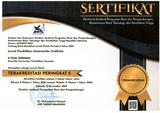Pengaruh Teknik Umpan Balik pada Model Pembelajaran STAD (Student Teams Achievement Divisions) terhadap Pemahaman Konsep Matematika Siswa Kelas VII Non Unggulan di SMP Negeri 1 Busungbiu
DOI:
https://doi.org/10.23887/jjpm.v5i2.8387Abstract
Penelitian ini bertujuan untuk mengetahui perbedaan pemahaman konsep matematika antara siswa yang mengikuti pembelajaran dengan teknik umpan balik sukarela, teknik umpan balik penunjukkan dan teknik umpan balik konvensional pada model pembelajaran STAD. Populasi dari penelitian ini adalah siswa kelas VII Non Unggulan SMP Negeri 1 Busungbiu. Sampel ditentukan dengan teknik cluster radom sampling. Data dikumpulkan melalui tes uraian yang diberikan pada akhir penelitian sebagai pemahaman konsep matematika siswa. Data dianalisis menggunakan Uji ANAVA Satu Jalur dan Uji Scheffe. Dari hasil analisis data diperoleh: pertama, terdapat perbedaan pemahaman konsep matematika siswa dengan teknik sukarela, teknik penunjukkan dan teknik konvensional (Fhitung=26,7063 lebih besar dari Ftabel=3,09); kedua, rerata skor pemahaman konsep matematika siswa dengan teknik umpan balik melalui penunjukkan lebih tinggi daripada teknik umpan balik secara sukarela (Fhitung= 7,605 lebih besar dari F’= 6,18); ketiga, rerata skor pemahaman konsep matematika siswa yang diterapkan teknik umpan balik sukarela lebih tinggi daripada teknik umpan balik konvensional (Fhitung= 20,3 lebih besar dari F’= 6,18); dan keempat rerata skor pemahaman konsep matematika siswa dengan teknik umpan balik penunjukkan lebih tinggi daripada teknik konvensional (Fhitung= 52,3 lebih besar dari F’= 6,18). Berdasarkan hasil penelitian disimpulkan bahwa teknik umpan balik berpengaruh terhadap pemahaman konsep matematika siswa. Pemahaman konsep matematika siswa dengan teknik umpan balik penunjukkan paling baik daripada teknik umpan balik sukarela dan konvensional.Kata Kunci : teknik umpan balik sukarela, teknik umpan balik penunjukkan, teknik umpan balik konvensional, pemahaman konsep matematika
This research aim to study difference of understanding of mathematics concept among student who learn with voluntarily feedback technique , through declaration and conventional technique. The population of this research was the reguler 1st grade students in SMP Negeri 1 Busungbiu. The samples in this research was doing by cluster random sampling. The data collection was conducted through essay test which was given in the end of the research as the the students' mathematically conceptional comprehension. The data were analyzed by using One Way ANAVA Test and Scheffe Test. From the data results, it was obtained: first, there are the differences of the students' mathematically conceptional comprehension, with voluntarily feedback technique, through declaration and conventional feedback technique ( Fcount=26,7063 > Ftable=3,09); second, the average value of the students' mathematically conceptional comprehension with feedback technique through declaration was higher than the voluntarily feedback technique ( Fcount= 7,605 > F'= 6,18 is); third, the average value of the students' mathematically conceptional comprehension with voluntarily feedback technique was higher than the conventional feedback technique ( Fcount= 20,3 > F'= 6,18); and fourth the average value of the students' mathematically conceptional comprehension with feedback technique through declaration is higher than conventional feedback technique. ( Fcount= 52,3 > F'= 6,18). Based on the results, it can be concluded that the feedback techniques give positive effect for the students' mathematically conceptional comprehension. The students' mathematically conceptional comprehension, with the feedback technique through declaration was better than the voluntarily feedback technique and the conventional feedback technique.
keyword : the voluntarily feedback technique, the feedback technique through reference, the conventional feedback technique, mathematically conceptional comprehension.
Published
2016-09-05
Issue
Section
Articles
License

Jurnal Pendidikan Matematika Undiksha is licensed under a Creative Commons Attribution-ShareAlike 4.0 International License.





